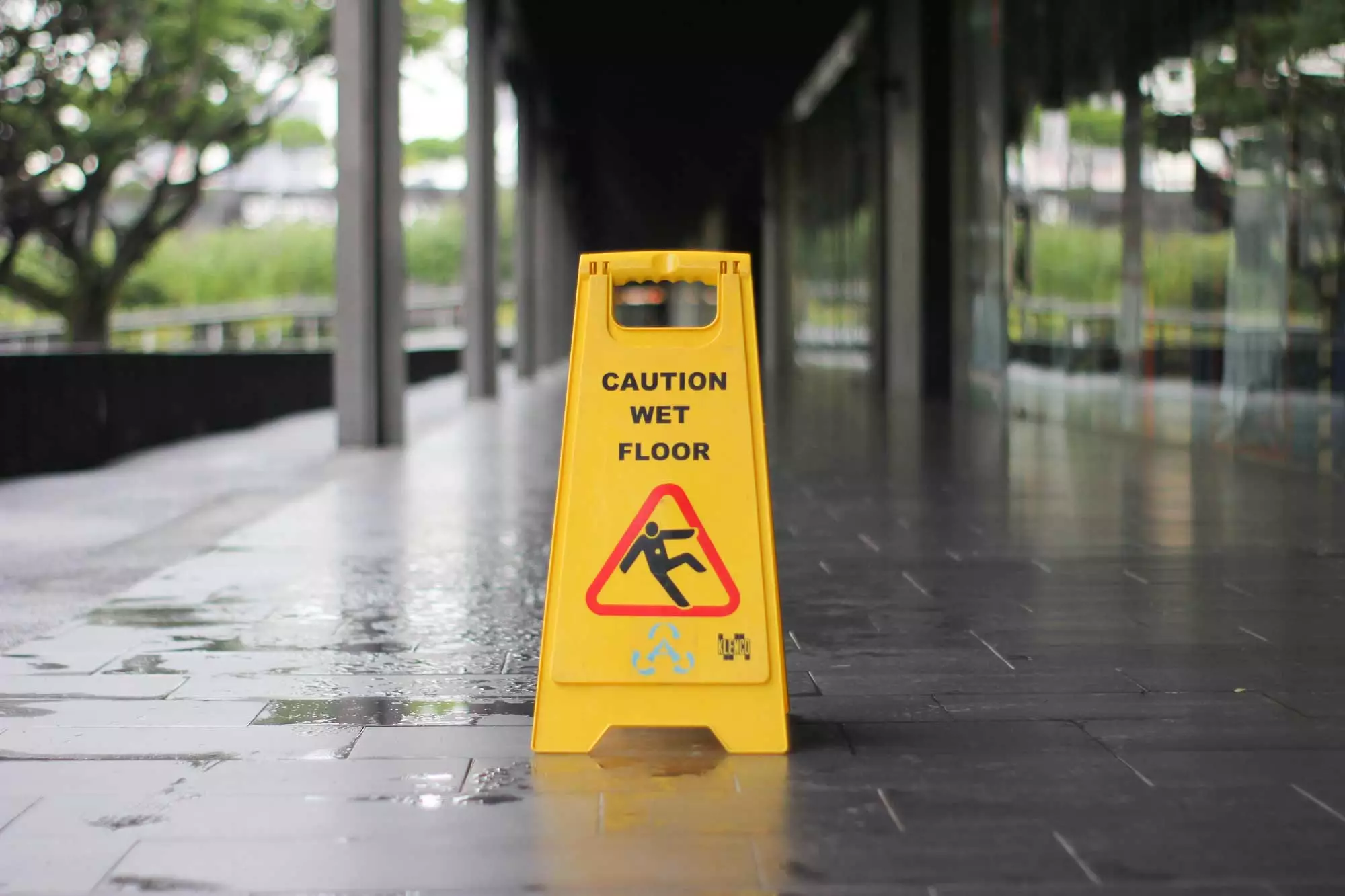In fortunate circumstances, a slip-and-fall causes nothing more than a bruised ego. In some cases, however, the consequences can be life-altering. Falls result in 8 million emergency room visits each year as well as 11 percent of all occupational fatalities for men and 5 percent of job-related deaths for women.
If you have slipped and fallen on spilled liquid or debris in a public place like a store and you have sustained an injury, you may have a legal claim and may be able to seek compensation for medical costs, lost wages, and additional costs related to your injury.
How To Sue a Store for Injury: The Process
The process for filing a legal claim against a retailer begins as soon as you slip-and-fall. Having the right information and taking steps to protect your rights will give you the best chance of securing a fair settlement. Here are the steps you will want to take:
- Start documenting right away. Take a look around you as soon as you fall. If possible, take photos of where you fell, the surrounding area, and anything that may have caused your fall. Get the contact information of any witnesses. Write down anything you can about the fall as soon as possible, including the time, location, and any details you can remember.
- Report the fall. Immediately report your fall and injury to the store owner, manager, supervisor, or landlord. Ask them to create a written report and request a copy.
- Report the accident to a manager, landlord, or owner. Ask them to create a store incident report and request a copy of this report. Get the name and contact information of the manager or person you spoke with but avoid getting into a conversation about what happened. Stick to the facts of the case. In some cases, a manager or store owner will try to minimize the injury or will try to imply you caused the fall. It is important to get evidence, to the best of your ability, so the store can be held accountable if they contributed to your fall.
- Get medical help as soon as you can. Even if you suspect your injuries are minor, it is important to get a medical evaluation. Some injuries may not have immediate, obvious symptoms but can still require treatment. If you have hit your head, it is especially important to seek medical attention. In 2019 alone, there were 61,000 head injury fatalities in the U.S. and a head injury is one of the most common injuries to sustain if you fall on a hard surface. Getting medical help can allow a doctor to start treating you and you’ll want to get copies of your medical evaluation records, too, in case you decide to sue the store where you fell.
- Follow through on your medical plan. If a doctor recommends a treatment plan, be sure to follow that plan to have the best chance possible at recovery. Keep careful records of your recovery. This may mean keeping track of all your appointments, any money you spend on medical care or transportation to medical care, any symptoms you have, and any time you have had to lose at work due to your injury.
- Contact an attorney if your injury is serious. Customers don’t expect to be injured in a store and don’t typically know how to sue a store for injury. If you have been injured seriously enough that you need medical care, have had to lose time at work, or have needed to pay out of pocket due to your injury, schedule a consultation with a store accident attorney. An attorney can tell you whether you have a claim and may be able to work with you to help you seek compensation for your losses.
Slipping and falling in a grocery store, home hardware store, or any retail space can be frightening and upsetting. It’s important to stay calm and to try to gather information and documentation about your injuries and to get medical treatment if you need it. These steps can help you and your attorney if you decide to pursue a lawsuit.
Store Injury Settlements
Injured customers and visitors can seek grocery store slip-and-fall settlements if they have fallen in a grocery store and been injured and their fall and injury were caused by the store’s negligence. Slip-and-fall lawsuit settlements help injured customers and visitors seek compensation for lost wages, medical bills, and the many other costs which are possible with a serious injury.
Employees of retail stores who slip-and-fall in their workspace usually do not have a personal injury claim but can usually seek workers’ compensation benefits for any injuries they suffer.
I Fell in a Store — Now What?
After a fall, the most important two things are to safeguard your health and to protect your ability to seek compensation if you need it. Unfortunately, in some cases, store managers or owners may try to get you to admit the fall was an accident or may even have their insurance company contact you.
Do not talk to the insurer, sign any paperwork, or agree to anything unless you speak to an attorney representing you first. Secure any documentation you can, get medical help, and contact an attorney if you have been seriously injured or if you are being asked to sign paperwork or speak with an insurance company.
Store Accident Lawyers
Finding the right lawyer is important if you’ve been injured in a Walmart, grocery store, Lowe’s, CVS, Kroger’s, Costco, Walgreens, Target, or any retail environment. The right attorney has experience with store injury settlements and can review the details of your situation to determine whether you have a case. Attorneys can communicate with any insurance companies involved, gather evidence in your case, and build a strong case.
Filing a slip-and-fall lawsuit is complex, and an experienced attorney at Johnson Garcia Law can navigate this process on your behalf, so you are free to focus on your medical treatment. Our attorneys have years of experience and are dedicated to helping customers who have been injured in stores. We seek out all liable parties and pursue compensation so you can get back to living your life after an injury.
FAQs
The clients we see every day at Johnson Garcia Law have questions about their slip-and-fall settlements and claims. We have put together this FAQ to address some of the most common questions we see.
Can I Sue for a Slip-and-Fall Accident?
Not every slip-and-fall injury immediately results in a lawsuit. To sue after being injured at a business such as a store, you need to have been injured and your injuries need to have been caused by the store or store employees’ negligence. In addition, the store must have been reasonably expected to know about the hazard which caused your fall. For example, if a store had an ongoing water leak and you slipped and suffered a back injury because the store did not adequately fix the leak, you may have a claim.
If you are an employee at the store and slipped and fell during your work duties, you may have a workers’ compensation claim. If your employer is a workers’ compensation subscriber, you cannot pursue a lawsuit against your employer, even if they were negligent, but it does provide benefits to cover medical bills and lost wages.
If you’re not sure whether you can sue for a slip-and-fall you have suffered, you can always reach out to Johnson Garcia Law and a member of our team will review your situation with you.
How Much Do You Get for a Slip-and-Fall?
There really is no average payout for slip-and-fall accidents, because each case is different. Settlements can range from thousands of dollars to tens of thousands of dollars to even more. This depends on factors such as the severity of your injuries, how much time you have lost at work because of your slip-and-fall, the expected long-term effects of your injuries, the medical costs you need to pay, and other factors.
How Do You Prove Negligence in a Slip-and-Fall Case?
After a slip-and-fall at a business, evidence is important because you must establish that negligence caused your injuries. You may be able to prove negligence by gathering documentation or by working with an attorney. An attorney may be able to secure evidence that a store was warned about a roof runoff before your fall, for example, but failed to act. Attorneys have access to resources, such as investigators, to help them find evidence in slip-and-fall cases.
Are Slip-and-Falls Hard to Prove?
Every case is different, but there are a few things that can help you prove a slip-and-fall case. If the store has a retail incident report, this can be helpful. Often, stores are reluctant to share this report, but an attorney representing you can usually secure documentation about the accident from the store or their insurer. You may also be able to prove your case if you have witness testimony, medical records about your injury, or photos of where you fell and the surrounding area. Your attorney can also help secure any available evidence to help strengthen your case.
Don’t see your slip-and-fall question on this list? If you have been injured after falling in a store and have questions about your specific case, contact Johnson Garcia Law for a consultation or call us at 832-844-6700. Our team is dedicated to helping secure store injury settlements for customers who have been injured through no fault of their own. We can discuss your specific situation, so you’ll have the most accurate information before making a decision about what to do next.


